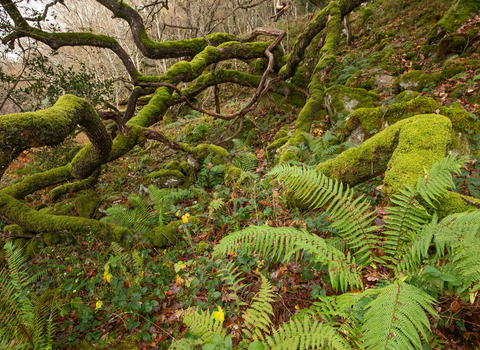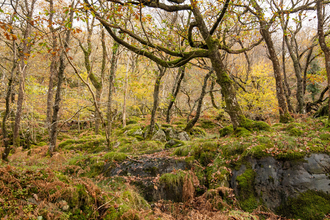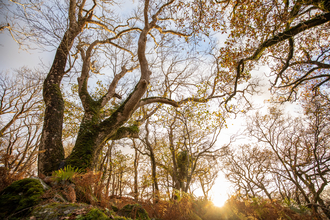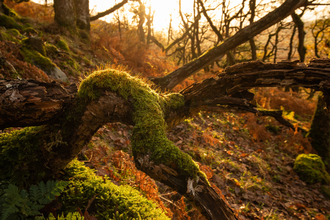Temperate Rainforest Research Programme.
Our restoration programme is creating new woodlands to restore and reconnect the temperate rainforest (TRF) of the British Isles. The aim is is to further our understanding of the status, management and restoration of temperate rainforests in the changing climate of the UK - the start of a 100-year landscape restoration. New woodlands will be created through planting, combined with natural regeneration where appropriate. This planting programme represents a unique opportunity for research across both the environmental and social sphere. A research fund of £450,000 has been established to support projects that fit with the research objectives of the programme.
Our research priorities
Three areas of activity have been prioritised for this research programme:
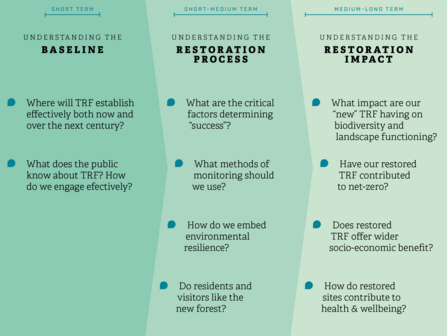
Each of these priorities has been further sub-divided into themes of interest with a range of indicative research questions. We encourage innovative approaches that sit clearly within the main research priorities of the programme.
Research call
After a competitive research call in Autumn 2024 including internal and external peer review, we awarded 3 Main Research Grants and 2 Aviva Rainforest Scholarships.
Main research grant
Bangor University
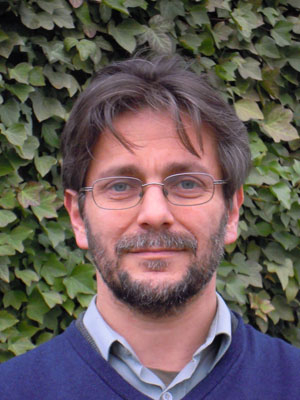
Professor John Healey, Professor of Forest Sciences, Bangor University.
John is a forest scientist with over 40 years of research experience in woodland restoration in the UK and internationally. He has led research projects on forest diversity, carbon storage, woodland resilience, restoration and natural regeneration. He brings skills in designing and delivering field-based experiments relevant to the Aviva rainforest restoration programme. During his academic career John has supervised 28 PhD students and spent 36 years teaching forest science and ecology, thereby underpinning the skills base in this critical environmental sector. His research work is applied, and he frequently translates his findings into practical guidance for policy makers and land managers. Being based in Wales, John has written several reports to National Resources Wales on woodland management for resilience (2023) and to the Welsh Government on ‘climate-smart’ woodlands as well as ash dieback in woodland nature reserves (2024). He currently sits on the Defra Trees and Woodlands Scientific Advisory Group.
Project team - Professor John Healey, Dr Marielle Smith & Dr Bid Webb and Adam Dawson of The Wildlife Trust of South & West Wales.
Title - Effective Rainforest Restoration methods for Carbon & Biodiversity Recovery.
Overall aims - To provide robust experimental evidence of the most effective rainforest restoration methods for environmentally adverse sites where dense bracken, poor soils or grazing may impact establishment of trees. Secondly to determine the long-term restoration trajectory and carbon sequestration potential of these woodlands through a woodland chronosequence in England and Wales.
Location - Experimental site at Trellwyn Fach in south-west Wales with a wider chronosequence of carbon measurement across Wales and NW England.
Evidence gaps addressed - Understanding how to improve survival of newly established seedlings on challenging sites to enable carbon sequestration whilst maximising biodiversity uplift. In addition, improved measurements of above-ground carbon stocks and growth rates of key rainforest species will improve yield models of non-commercial rainforest tree species.
Leeds University
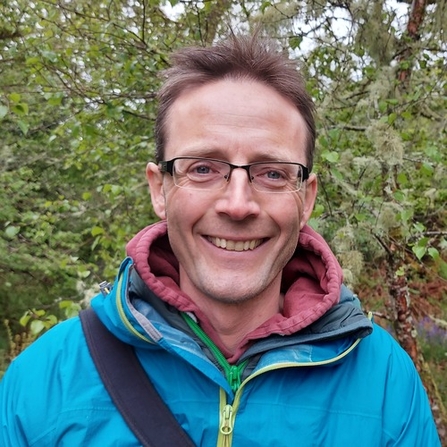
Professor Dominick Spracklen, Professor of Biosphere-Atmosphere Interactions, Leeds University
Dominick is based in the School of Earth and Environment at Leeds University. He was previously a NERC Advanced Fellow, a Philip Leverhulme Award holder and is currently a European Research Council Fellow reflecting his wide-ranging impact in the field of tropical and temperate forest-climate interactions. He leads a research group at Leeds University which works to understand interactions between the biosphere, atmosphere and climate and the way that these interactions are being altered by human activity. Dominick has a strong track record of working with land managers to deliver conservation evidence and has ongoing research and monitoring projects with Forestry England, Natural England, RSPB, The National Trust, Woodland Trust and Yorkshire Wildlife Trust as well as strong overseas links. He currently leads the Restoring Hardknott Forest and Upper Duddon Landscape Recovery projects and sits on the Wild Ingleborough Steering Group.
Project team - Professor Dominick Spracklen & Dr Ben Silver
Title - Mapping the microclimate of the UK’s temperate rainforest
Overall aims - This project will improve understanding of the temperate rainforest bioclimatic zone. It will monitor the microclimate across the existing zone and model how landscape setting alters it. By combining remote sensing data with machine learning the project team will then produce a detailed microclimatic map to better inform our rainforest restoration activities. In addition, the team will also evaluate the impact of established rainforest on downstream flooding by better monitoring the interception of water.
Location - UK wide.
Evidence gaps addressed - Microclimate variability may provide TRF resilience to future climate change but little is known about how the microclimate varies across the TRF bioclimatic zone. This means that we do not know where to prioritise TRF creation and restoration to maximise future resilience to climate change. To address this knowledge gap we will combine monitoring of microclimate across the TRF bioclimatic zone with remote sensing and machine learning. Existing maps of TRF climate biome are available at 1 km resolution and do not include microclimate variability due to topography, tree canopy or proximity to water courses. We will create the first high-resolution map of TRF microclimate at 10 m resolution, informing TRF conservation and restoration. Woodlands reduce downstream flooding but the impacts of TRF on flood risk are not well documented. Non-vascular vegetation captures considerable quantities of rainfall, increasing rainfall interception by nearly a factor of 3. This project will make the first estimate of the impacts of TRF on downstream flooding and compare the flood mitigation benefits of TRF versus other woodland types. This will provide new evidence of the benefits of TRF for natural flood management.
Cardiff University
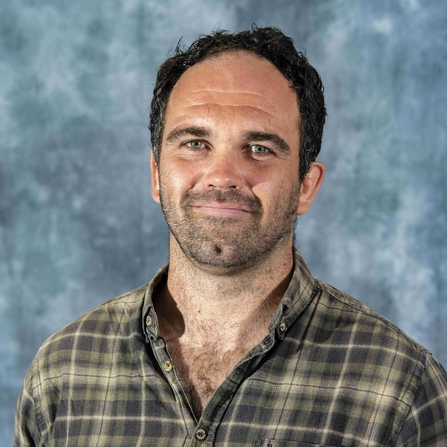
Dr Jim Vafidis – Lecturer in Science, Environment & Computing, Cardiff University
Jim is a field biologist with 20 years’ experience working for conservation charities and consultancies delivering environmental monitoring and woodland management. As an academic at Cardiff University, he specialises in GIS, spatial analysis, remote sensing, UAV mapping whilst undertaking research to deliver practical tools to enhance species and habitat management. Recently, Jim has been applying bio-acoustic monitoring techniques to woodland sites and as part of this research project, he will work closely with project partners Wilder Sensing, an environmental consultancy which specialises in this type of data collection, processing and analysis.
Project team: Dr Jim Vafidis, Dr Cat Scutts (Wilder Sensing) & Dr Sam Bonnett (UWE)
Title of project: Rainforest Sounds: Baseline Biodiversity Monitoring and Change Detection
Overall aims: To develop an integrated bio-acoustic monitoring system for temperate rainforest restoration, capturing above and belowground biodiversity through distinct soundscapes. This system will establish bio-acoustic and biodiversity indices as non-invasive proxies for ecosystem health, identifying restoration progress, threats, and gaps in ecosystem balance across sites of differing maturity, while engaging communities.
Location: Wales
Evidence gaps addressed: Healthy woods produce richer, more diverse soundscapes as they support greater biodiversity. However, a large part of the biodiversity of healthy rainforests lies below ground in the soil, but this is difficult and expensive to measure with traditional laboratory methods. Sound can be used as a proxy; a biodiverse system is relatively noisy from the obvious sounds of birds and mammals but also in the sounds of insects above and below ground. Bio-acoustic monitoring of the soils of temperate rainforests could offer efficient tools to capture this indicator of health but the necessary acoustic indices still need development. By developing a bioacoustics framework for British temperate rainforests new insights can be offered into restoration success.
Reading University
One of the key threats faced by our current rainforests is climate change. We commissioned Professor Nigel Arnell from Reading University to model the impact of a range of climate scenarios on the biogeographic zone of our temperate rainforests.
There were three conclusions
- The key drivers of climate risk to temperate rainforests all increase but particularly in southern and western regions. It gets drier with increased fire dangers and risks of drought.
- The risks to the viability of temperate rainforests on strongly dependent on the pathway of future emissions. High carbon dioxide emissions as characterised by RCP8.5 would be extremely challenging to their continued survival but if we can keep the increase in global average temperate to less than 3 degrees by 2100 these risks are considerably smaller.
- The climate envelope of temperate rainforests is sensitive to the assumed upper temperate limit (average temperature of warmest month of <= 16 degrees C). However, the evidence for this upper threshold in the UK is currently limited. If this threshold is higher, the temperate rainforest may be less sensitive to climate change than this pilot suggests.
Five knowledge gaps were identified
- We need a better understanding of where the remaining temperate rainforests are in the British Isles. Our current understanding is patchy and variable across the devolved nations. If we mis-identify woodlands as rainforest we risk mis-identifying their climatic limits and therefore, undermine our modelling.
- We need a better understanding of the climatic limits to temperate rainforest in the UK. How important are other factors such as mist and fog, the number of wet days or changes in the frequency of extreme weather events?
- We need to understand the challenges posed to our rainforests from a wider range of climate scenarios and gain an indication of levels of risk. What is the impact of climate tipping points for example?
- How will changes in climate impact on the indicator species of temperate rainforest – would drier characteristics alter the habitat in fundamental ways or simply alter species composition?
- We need to understand temperate rainforest microclimates better as climate refugia may play an important role in adaptation strategies. (See Dominick Spracklen’s funded project at Leeds University which is picking up this challenge).
Aviva rainforests scholarships
We are also delighted to welcome our first Aviva Rainforest Scholars.
Forest Research
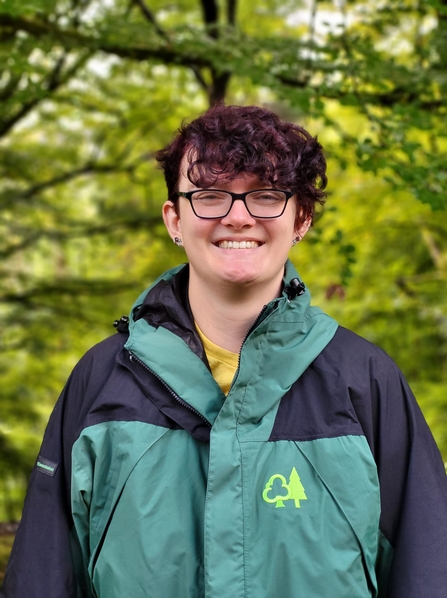
Dr Ellie Scopes -Spatial modeller, Forest Research
Ellie is based in the Land Use and Ecosystem Services group at Forest Research and is affiliated to the Environment and Sustainability Institute of Exeter University. Ellie’s research focuses on modelling species distributions using population ecology to assess targets and opportunities for conservation action. She uses a variety of statistical techniques, including Bayesian population modelling, to assess population parameters, and the habitat and climate factors which are driving changes. This can then inform evidence-based land management decisions.
Title: Exploring the connectivity of temperate rainforest for indicator species.
Overall aims: This project will model how key rainforest species such as lichens disperse within the current temperate rainforest landscape. It makes use of an existing tool called RangeShifter and will apply statistical tools to explore where and how fragmented patches of rainforest can be better connected through new planting. The results will be presented using R Shiny App which will allow practitioners within the conservation sector to explore the results and evaluate different scenarios of woodland expansion.
Location: South-west England and/ or Isle of Man
Bangor University

Dr Karina Marsden – Lecturer in Soil Science, Bangor University
Karina is a soil scientist whose research focuses on gaseous emissions from soil, rhizosphere processes and plant-soil-microbe interactions. As an Early Career researcher, she has already undertaken a Marie-Sklodowska Curie Actions Global Fellowship working between Australia and the UK as well as completing post-doctoral research on the NERC Upland-N20 project. At Bangor she now teaches courses on water, air and soil pollution as well as contributes to field courses overseas. She currently chairs the Welsh Regional Soils Discussion Group for the British Society of Soil science.
Title: Are lower plants large players in the overall carbon budget of temperate rainforest systems?
Overall aims: This project will establish whether the lichens and bryophytes growing on established rainforest trees act as sinks for non-CO2 greenhouse gases. It will evaluate both the spatial and temporal fluxes from trees in these forests using field-based monitoring.
Location: Central and North Wales.
Find out more
You can find more information on the Temperate Rainforests Research Programme below.
Sign up to receive programme updates
We're thrilled that you're interested in the TRF research programme. To hear about the latest development and updates, register your interest below.
FAQs
If you have any questions please look at our frequently asked questions.
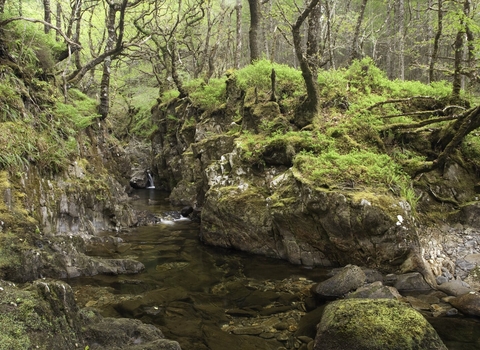
Temperate rainforest © Peter Cairns/2020VISION
Any questions?
We welcome research at our rainforest sites. If you are interested in collaborating, please contact Dr Ruth Swetnam (Carbon & Research Manager) or Tara Cummins (Programme Co-ordinator)”

